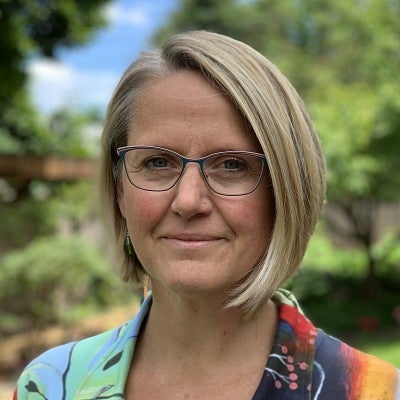
Human Physiology
sdawson@uoregon.edu | 541-346-6836
Courses: HPHY 322/324 Human Physiology I & II, HPHY 111 The Science of Sex, HPHY 611 Professional Skills I: Effective Teaching, HPHY 411 Teaching Science
In my classes you will:
- Practice foundational, transferrable skills.
- Learn with and from peers.
- Interact during exciting, participatory class meetings.
I was invited into the Teaching Academy because:
- I am an Ersted Award Recipient.
- I was a member of the Working Group on Active Teaching and Learning.
- I was a member of the Working Group on Inclusive and Intercultural Teaching.
- I participated in a Summer Institute on Scientific Teaching.
- I participated in the UO Summer Teaching Institute.
In what ways are you working to make your teaching inclusive?
On the first day of class, I share with my students the intentional ways that I hope they experience belonging, representation, and voice in the course. I make an effort to learn and use as many student names as possible (even in 300 student classes) so they know they are not just a number with the hopes of improving their sense of belonging. I use random call – not as a mechanism to bust students who are not paying attention but as an opportunity for those whose identity comes with less power and privilege to be heard and have a voice (it is an invitation, not a demand). I am careful to that images used, and clinical cases discussed, represent people with a variety of identities.
What do you do in terms of professional engagement with the teaching and learning culture on campus or nationally?
When I first began as a teacher on campus 15 years ago I committed to attend one TEP workshop or book club each term to learn more about best practices uncovered by the scholarship of teaching and learning. When week-long learning experience presented themselves, I leaned-in (e.g.: Working Group on Active Teaching and Learning, Summer Institute for Scientific Teaching). Over time I began to join regional and national meetings about teaching, and then slowly found myself in a position to lead workshops based on my own classroom innovations and application of best practices. This fall I will attend my first international conference – the International Society for the Scholarship of Teaching and Learning – in Norway.
In what ways was your teaching in this course research-led—informed by research on how students learn and inflected by UO's research mission?
Research-led or evidence-based teaching practices are at the core of each class I teach. I begin by Backward Designing the course, meaning that I start with goals and specific learning objectives, and from there design the formative assessments and activities that will help students achieve those objectives, and the summative assessments that will show up in the grade-book. The design process includes thoughtful and meaningful pre-class activities that ensure our special in-class time together can be used for challenging topics that require students and I to work together. I limit the amount of direct lecture employed into small 5-10 minute chunks, and embedded questions and activities such as predictions, case studies, clicker questions, think/pair/share and think alouds – all designed to engage students in their learning. I regularly bring researchers into the classroom for short cameo appearances to share how their current research relates to the topic under discussion to connect our teaching and research mission in a way that benefits student learning.
What are you reading right now?
I’m currently reading Willful Blindness: Why We Ignore the Obvious at Our Peril by Margaret Heffernan, as well as Radical Candor by Kim Scott (for the 3rd time).
Where do you find inspiration?
In nature while in conversation with my spouse. Usually this looks like a hike up Mt. Pisgah or Spencer’s Butte while in deep conversation trying to solve the big and little challenges in life.
